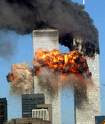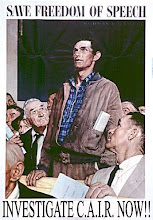From "America's Self-Crippled Foreign Policy"An Interview with Yaron Brook (YB), Elan Journo (EJ), and Alex Epstein (AE)
By Craig Biddle (CB)
CB:
The Wall Street Journal recently reported that General McChrystal’s strategy in Afghanistan “puts a premium on safeguarding the Afghan population rather than hunting down militants.” What do you make of that strategy?
EJ: This same strategy was at the heart of Bush’s policy—and it meant that U.S. forces were never allowed to fight all out to defeat the Taliban. The Taliban and its jihadist allies scattered, then regrouped, and now are fighting to control Afghanistan and also Pakistan. U.S. casualties in the first eight months of 2009 are already higher than all of 2008, and more than double the toll during the first three years of the campaign. A key point we make in Winning the Unwinnable War is that this “compassionate” policy is self-destructive of American lives and security. It’s central to what has made the war seem unwinnable. Now we’re seeing that policy being implemented to the nth degree, and many more Americans—on the battlefield, and perhaps at home—will pay the price for it.
YB: In a chapter on “Just War Theory,” Alex and I discuss the moral ideas informing the policy you’re seeing unfold in Afghanistan. Those ideas—primarily the embrace of selflessness as a moral ideal—are why America today is unwilling to wage real war to defeat its enemies. Americans used to fight to win; think of General Sherman during the U.S. Civil War or Patton or MacArthur in World War II. But our policy in Afghanistan—seeking to win the love of Afghanis, rather than defeating the Islamists—can only serve to further embolden our enemies.
CB: With President Obama planning to pull most of our troops out of Iraq by next August and to increase the number of U.S. troops stationed in Afghanistan, politicians and pundits are mired in a debate as to whether or not this is the right course of action: Should we or should we not be pulling troops out of Iraq and deploying them to Afghanistan? How would you answer this question?
YB: Just as Bush did on several occasions, Obama warns us not to expect “victory” in Afghanistan. And top U.S. military officials tell us the Taliban are winning. It is immoral to send any troops to fight in any war that our leaders believe to be—and through their policies have made—unwinnable. More broadly, it is outrageous that the mighty United States should find itself with two unresolved conflicts like these. In a sense we’re in an impossible fix, because neither option you mentioned is particularly good, nor is it clear which option is the least bad. This is precisely the kind of situation that our foreign policy should never get us into.
As for Iraq, what purpose do American troops serve there today? In what way does their presence make Americans safer or help in winning this war? Leaving the Middle East today would be horrible—it would embolden our enemies and make it more difficult to deal with future threats. But staying only places our troops in harm’s way, with no real benefit to U.S. security.
EJ: The options you bring up in the original question, Craig, are emblematic of the dominant approach to foreign policy. This is the ad hoc, crisis-management approach of dealing with each flash point or crisis in isolation, and throwing some policy at it to see what “works.” And “works” here means something like “makes the crisis momentarily less urgent.” The view we convey in the book is that America can achieve victory, but only if it adopts a principled, integrated approach [*]. We can crush Al Qaeda, the Taliban, and Islamists in Afghanistan-Pakistan. We can deal with Iraq. We can deal with sundry hostile nations in the region. To do that, though, requires a larger project that begins with defining and defeating our primary enemy—the Islamist regime in Tehran, which inspires and leads the Islamist movement. Our goal should be to defeat that movement and its followers, so that the Islamist goal of imposing sharia rule comes to be widely acknowledged as a lost cause.
Read the whole thing____________________
*Also see
There is nothing more un-realistic than trying to create a plan without knowing where we are going—or assuming that no plan is possible since reality is "really" always in flux and more in the last paragraph of
Winning is not an Option; It is the Only Way to Defeat an Enemy Determined to Defeat You____________________
Fighting "An Unwinnable War"
. . . the “strictly correct military decision would still be to kill them [the Afghan goat herders] without further discussion, because we could not know their intentions.” Working behind enemy lines, the team was sent there “by our senior commanders. We have a right to do everything we can to save our own lives. The military decision is obvious. To turn them loose would be wrong.”
But the men of SEAL Team 10 knew one more thing. They knew that doing the right thing for their mission—and their own lives—could very well mean spending the rest of their days behind bars at Leavenworth. The men were subject to military rules of engagement that placed a mandate on all warriors to avoid civilian casualties at all costs. They were expected to bend over backward to protect Afghans, even if that meant forfeiting an opportunity to kill Islamist fighters and their commanders, and even if that meant imperiling their own lives.
--Brief excerpt from the article "An Unwinnable War?" by Elan Journo in
The Objective Standard http://www.theobjectivestandard.com/issues/2009-fall/an-unwinnable-war.aspFrom the introduction to Winning the Unwinnable War: America’s Self-Crippled Response to Islamic Totalitarianism. The book is being published by Lexington Books and is scheduled for release this NovemberCraig Biddle writes: I recently interviewed Dr. Brook, Mr. Journo, and Mr. Epstein of the Ayn Rand Center for Individual Rights. Mr. Journo is the editor of a new book,
Winning the Unwinnable War: America’s Self-Crippled Response to Islamic Totalitarianism (Lexington Books, 2009. 250 pp. $27.95 [paperback]), which contains essays by all three men. The book is scheduled for release this November and can be preordered through the Ayn Rand Bookstore (
http://www.aynrandbookstore.com/). This interview was conducted orally and retains the character of an informal discussion. —Craig Biddle
Read the whole article at http://www.theobjectivestandard.com/issues/2009-fall/an-unwinnable-war.aspFOR MORE on SEAL Team 10 and Marcus Luttrell, see
Answer to "Compassion in Combat"and
COMPASSION IN COMBAT







.jpg)





.jpg)
.png)


















